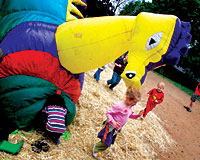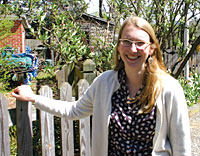Rainbow Mountain Children’s School in West Asheville has brought in its first “outsider” to run a school that put experiential, holistic learning on the Western North Carolina map 30 years ago. Reneé Owen was hired away from Paradox, Colo.,—but how she came to be here requires just a bit of storytelling.

Once upon a time, after college, Owen was feral—which is to say, she was a wild thing, a gatherer of tropical fruit and dweller in the margins—in Hawaii, where the (feral) livin’ is easy. She was on a spiritual quest and came to see that she was finally finding herself when she let go of pretty much everything and accepted each day as it came. The quest continued for four years.
Then Owen met a wonderful jeweler and decided to marry him and do art. They moved to the high desert in Utah near the intersection known as Four Corners. But livin’ wasn’t necessarily easy there. They wanted some land, and land wasn’t cheap—while renting seemed impossible.
“We went to Moab just as a tourism boom hit and when we tried to find a rental we were 47th on the list of would-be renters,” she told Xpress, “but there were none available.”
So they moved from a conundrum to Paradox. There was even less “there” there, and they could consequently afford to buy five acres with a stream running through it. Then they had children, but there wasn’t a school. Students in town who attended classes spent three hours per day on a school bus because the community was regarded as too poor to support a public school. So, being a gatherer and a crafter, Owen gathered some families together and crafted a school based on learning as she had learned—through experience. It took.

Looking back at the school she invented in Paradox, Owen tells Xpress, “In the first state testing cycle, 70 percent of the students there were below grade level. A lot of the students were two to three grades below level. At the end of the first year, our students matched the state average, and for the last four years we were rated in the top 2 percent of grade schools in the state.”
Owen had decided (and convinced an investor) that creative freedom was a cornerstone of learning. The investor provided money for keyboards instead of going for more traditional items like new textbooks or desks. Every student received private piano lessons and classes moved outside.
“We started doing place-based learning, very hands-on stuff,” Owen says. “We went on field trips with a geologist and collected oral histories from older residents. We bought a video camera and the kids made an oral-video history archive for the town. Then they wrote skits about pioneer life based on the histories they’d collected.”
Others took notice. Last year the school won a Creative Ticket Award from the Kennedy Center, becoming one of five schools in the country recognized for integration of the arts into academic progams. This spring the students traveled to Washington and performed at Kennedy Center.
The road to Rainbow
Last fall, Rainbow Mountain was looking for a new chief. Director John Shackelton had somewhat reluctantly accepted the post in 2004 after several years as the school’s curriculum director, a position he much preferred. Still, as he tells Xpress, he believed in the school and its methods and if taking on the directorship was what the school demanded of him, he was willing. During Shackelton’s tenure, the school restructured its program to support almost explosive growth. An institution that had been started by three mothers in 1977 grew to include 70 students by 2002 and doubled that enrollment by 2006. Organizational methods that worked when the school was essentially a family affair needed to be revamped to accommodate the much larger community of students, parents and teachers.
But now, Shackleton tells Xpress, he feels like that work is done and he is ready to hand off the job and get back to his own agenda: teaching English and writing a book about his experience as an educator.
Joe Walsh, a member of the team assigned to search for a new chief, explains, “We conducted a nationwide search before we found Reneé.”
As Owen tells it, they almost didn’t find her. Candidates had been narrowed down to four who had already been scheduled for face-to-face interviews before she spotted a notice about the position. She contacted the search committee and was told she was too late—but then another candidate dropped out and, based on her experience, she was called east for a chat. The committee evidently liked what they heard.
Owen visited classes, met teachers and parents and generally acquainted herself with the burgeoning Rainbow Mountain Children’s School campus during a visit in April. She’ll start work July 1 and is currently moving her family to Asheville. Two of her children will attend Rainbow while the eldest will enroll in Asheville High.
Growth at the school suggests that many Asheville parents like the idea of holistic education. Days at the school begin with meditation, drift in and out-of-doors, and may as easily include dance and drawing as the three Rs. Nor has Owen been screened from parent criticism—much of which has centered on preparation in the upper grades.
“I hear people having nostalgia for the old days when there were only 50 students here, and one of the things I really want to do is to let people have a voice,” Owen declares.
“My focus next year will be on fourth through eighth grade, which is my area of strength, based on recent years in Paradox,” she says. “It’s very challenging for everyone to get everything they want in the upper grade levels. At that age the children begin to have strong preferences, very different ideas about what they want to do, and getting kids ready for high school is a huge task.”
In this regard, Shackleton notes that Rainbow students never receive report cards with grades until the last half of their eighth-grade year. At that point, he says it is seen as an introduction to the less holistic world of public high school, “because otherwise it will be a real shock.”
Watching students in classrooms and on the playground at Rainbow, grades and buzzers and regimentation seem as distant as blue Hawaii or a high desert village known as Paradox.
Let’s play Buckyball!
Rainbow Mountain’s Mark Hanf is one busy teacher: He designs games, hikes, camps, explores fractals and non-Euclidean geometry, includes astronomy, chemistry and physics in artwork and lesson plans, dips into alternative energy, Chinese medicine and harmonic geometry and proportion, and tries to understands how all of those vectors fit together in the thinking of the late inventor/theorist Buckminster Fuller.
Last summer, Hanf was one of the participants in the Design Science Lab in Asheville, a joint project of the United Nations, the Buckminster Fuller Institute, Black Mountain College + Art Center and multimedia-education company BigPictureSmallWorld. He left that week-long confab determined to use his experience to create a new kind of middle-school curriculum based on Fuller’s World Game and utilizing Fuller’s Dymaxion map.
Fuller’s map is a projection of the planet that depicts the “separate” continents as they actually are—one archipelago stretching from Patagonia to Australia. With it, a whole-earth island emerges.
Hanf wasn’t alone. Suzanne Watson, an artist and educator from Massachusetts, and Marnie Muller, a project director at the Asheville School, emerged from the lab similarly inspired.
Together, the three formed Earth Voyage, a “multimedia experiential educational organization that … uses a multiple-intelligences and whole-systems-thinking approach.” The goal is to make learning challenging and fun, and to overcome the ennui that often drives dropouts.
Earth Voyage was adopted by the Buckminster Fuller Institute, which funded development of a pilot curriculum. This spring, Rainbow Mountain students collaborated with Hanf, Muller and Watson to refine the instructors’ initial suggestions. Soon, they will test their creation alongside students from Celo’s Arthur Morgan School during a daylong gaming session at Blue Ridge Assembly in Black Mountain. The program will play out on a gymnasium-sized Dymaxion map.
Hanf says the next step will be to offer the Earth Voyage curriculum to other middle-schoolers in Buncombe County, then to those in the region and the state.
And, the world?
“Yes,” he told Xpress, grinning. “The whole world.”



Before you comment
The comments section is here to provide a platform for civil dialogue on the issues we face together as a local community. Xpress is committed to offering this platform for all voices, but when the tone of the discussion gets nasty or strays off topic, we believe many people choose not to participate. Xpress editors are determined to moderate comments to ensure a constructive interchange is maintained. All comments judged not to be in keeping with the spirit of civil discourse will be removed and repeat violators will be banned. See here for our terms of service. Thank you for being part of this effort to promote respectful discussion.